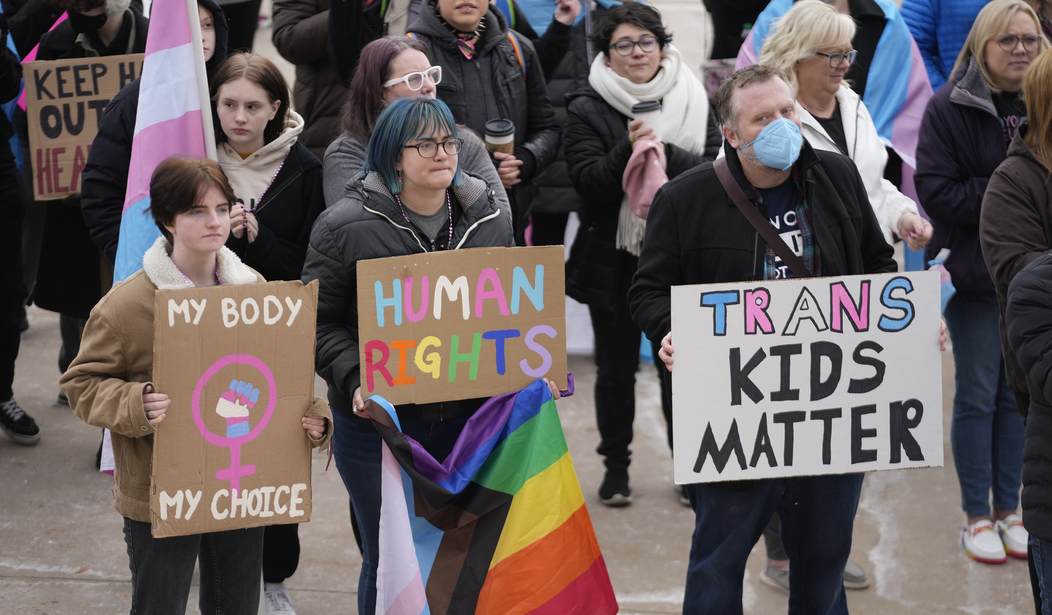One would think that, if one had a person laying on a table, giving birth - actually giving birth to an actual baby - that it would be safe to refer to said person, having said baby, as "her." One would also think that, if examining a patient, that patient has a thick beard, a deep voice, and (as the Brits say) a "twig and berries," that this person may be referred to as "he." Or at least one would think it is safe to record "female" or "male" on that patient's chart. This is important in the delivery of health care, as the treatment provided to the patient can be affected.
That is, if one presumes membership in a sane society. Not in the United Kingdom. Not anymore.
Nurses and midwives could face being struck off for intentionally mis-gendering patients.
Guidelines from the Nursing and Midwifery Council (NMC) regulator tells medics how they can 'express their beliefs appropriately' and when they run the risk of a sanction.
Under its latest update, it includes one example where a midwife who believes the Government is destroying the health service shares their opinion at a dinner.
Regulators would only take action if said midwife vowed to treat patients differently based on their political views.
Regulators would "...only take action if..." and insert action X here. That kind of qualifier could be used to justify almost anything - like depriving a midwife of her license after referring to a person in the process of giving birth as "her." The slippery slope isn't always a logical fallacy, and this one is yawning wide open in front of British practitioners.
Here's the onion:
But another example shared in the latest update has sparked concerns that sanctions could be dished out to nurses and midwives who address trans patients with the wrong pronouns.
In the hypothetical scenario, one nurse is described as deliberately misgendering a trans patient attending a diabetes clinic.
Despite the patient repeatedly asking the nurse to address them by their 'correct' gender, the medic refuses to do so, resulting in a formal complaint.
When the employer then confronts the nurse about her behaviour, she states that she was 'acting in accordance with her belief that human beings cannot change their sex or gender'.
The NMC concludes it would likely take action against the nurse for this act, though does not specify the exact penalty.
That takes some unpeeling. Once you remove the outer layer of bunkum in that statement, what it amounts to is that, in the United Kingdom, one can lose a license to practice for wrongthink. In other words, opinions held on a matter of biology can result in one losing one's livelihood. Take off the second layer, and it appears the UK's government seems to think it can punish anyone, at any time, for expressing an incorrect thought.
A thought. Not an action. A thought. An opinion. A judgment. A viewpoint.
See Related: Ohio: Transgender Candidate Disqualified From Ballot for Not Providing 'Deadname'
A Pioneer of 'Gender Affirming Care' for Kids Is Now Sounding the Alarm Against It
One can imagine an enormous Scotsman with shoulders that would span the Firth of Forth and a beard like a hazel bush raising a hue and cry because a nurse slipped up and referred to him as, well, him. Fortunately for the UK's medical community, some practitioners and allies are pushing back.
Stella O'Malley, psychotherapist and director of medical campaign group Genspect, said it was 'extremely concerning' language that could leave the NMC open to legal challenges.
She told MailOnline: 'Professionals, especially those working in healthcare where mis-sexing a person could have catastrophic implications, need to have the right to clarify and even highlight a person’s sex.
'For example, if a transman presents with stomach aches, the nurse might need to ascertain whether the transman, who is biologically female, could be pregnant.'
This is where medical reality comes in. It's essential, in fact, to the delivery of medical care. Case in point: One of our four daughters is adopted. While her parents and her sisters are all Scots-Irish-German in ethnic background, her background is French-Canadian/Arabic. When presenting her medical history, she has to present her biological family - what she knows of them - instead of us. She is not offended by this. It's a simple reality, and essential in the delivery of health care.
At some point, the nutballery has to stop. There are biological realities involved in the delivery of health care that may literally be life or death. There are also principles of liberty, wherein one's freedom to hold an opinion is supposed to be a primary principle of any free Western country. The United Kingdom seems to be rushing towards abandoning both of those principles, and they do so at their peril.
This seems appropriate.














